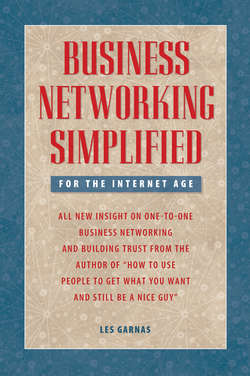Читать книгу Business Networking Simplified - Les Garnas - Страница 27
На сайте Литреса книга снята с продажи.
ОглавлениеChapter 4
HELPING
PROFESSIONALS
USE TIME WELL
Professionals—doctors, dentists, lawyers, accountants and others needing special qualifications to practice—face special challenges when it comes to networking. Traditionally, professionals have felt most comfortable interacting with their peers and may not have aggressively reached out to network with those outside their profession. But networking harder among your colleagues isn’t likely to keep you moving ahead in a highly competitive environment. If you want to be successful, you need to broaden the scope of your networking relationships beyond your friends in the profession.
Broaden Your Contact Base
The idea of broadening your contact base, however, might raise some critical issues for you related to standards and traditions in your field. What’s considered appropriate in your profession? Are there any restrictions on how and with whom you can network? Even though, in some professional environments—the legal profession for example—there were long-standing prohibitions against advertising and self-promotion, restrictions have largely disappeared. This has encouraged lawyers, doctors and others to try all manner of awareness-building to expand their practices. Many favor print media advertising and TV with the hope that business will roll in the door, thereby excusing them from having to make personal contact with decision-makers. Not so.
Having worked for many years with top accounting and law firms that spent millions of dollars on media, I find that the main result has been merely to increase the public’s awareness of the firms. In the cluttered world of advertising, this is a good outcome. But it doesn’t bring business in the door—people do, through face-to-face contact. Although millions are spent every year trying to drive decision-makers to professional services, good old-fashioned word-of-mouth is the most successful way to build a practice. Think about it: If your company is faced with a legal threat, which option would you, as General Counsel, choose? (a) To follow up on an advertisement that says XYZ Law Firm LLC is the premier law firm for problems like yours? Or (b) ask an admired business acquaintance which firm he might recommend? And more importantly, you would likely quiz your contact as to why he would recommend the person/firm for such an assignment. Alternatively, would you choose simply a dentist who does dental implants? Or one who has a reputation for having done hundreds?
Consumers or business consumers—we’re all savvy and sophisticated about what we want and, more importantly, how to get it. The clear message here is that as a professional you have to fit the message (your expertise and competence) to an identified problem. This only can happen by talking to people one-to-one so they can refer to you among their own peer groups, or buy from you. There are no quick fixes, so let’s take a look at some ways you can begin to expand your network.
Work vs. Networking with Laypeople
Reevaluate the rule that says my work comes first. Some professionals consistently avoid networking among laypeople by saying that they’ll network when their work is done—which for a busy professional is never! Just as you find time to attend professional association or society meetings to network among your colleagues, you can find time for other networking activities as well. Simply put your mind to it and get started.
Here’s a place where the internet can help you. Once you have established a network of people you want to have frequent communications with (so they can refer you, refer one another, or exchange a “heads-up” regarding an opportunity, for example), you can develop a Google site that in effect becomes a business-friends intranet wherein you can all share information and stay connected. It’s best to include a good number of people on your “intranet” that are in your geographic area so you can follow up with face-to-face meetings for a specific networking agenda, or group dinners or after-hours cocktail meetings where the larger networking group can share insights and personal connections.
